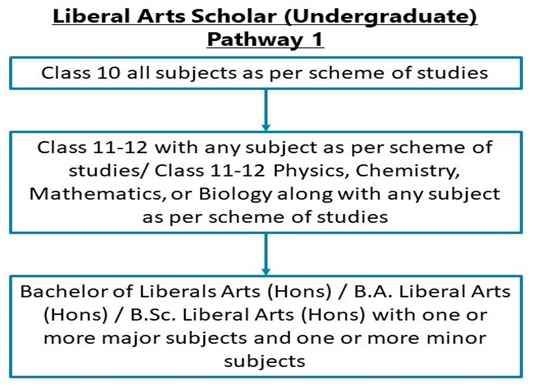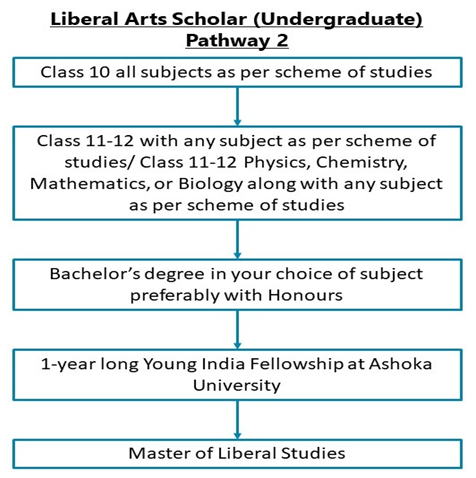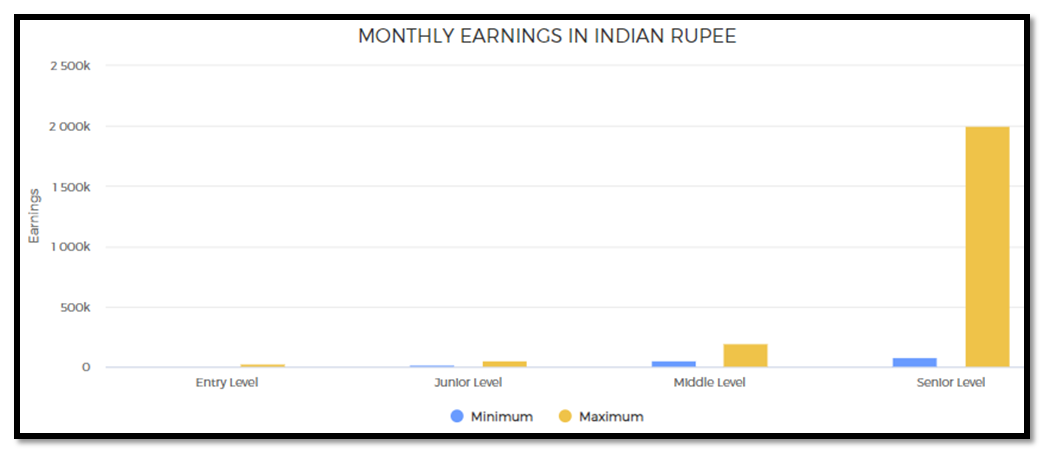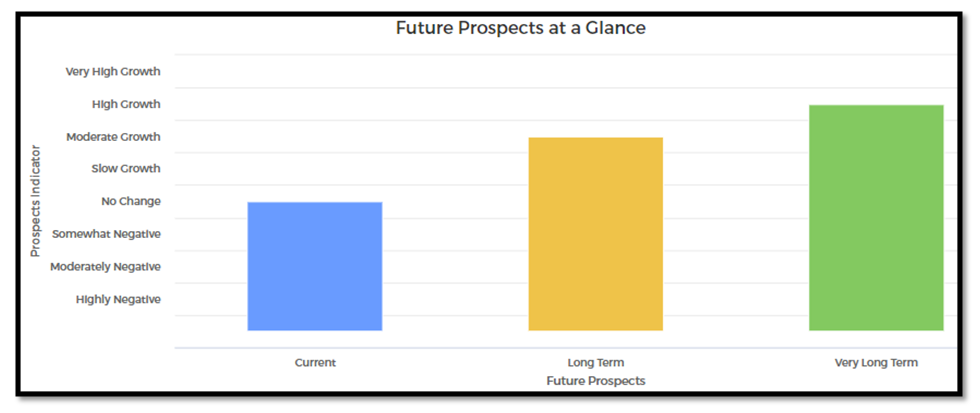Liberal Arts Scholar (Undergraduate)
Entry Level Qualification
12
Career Fields
Humanities, Liberals Arts & Social Science
For Specially Abled







 ,
,
About Career
PARTICULARS | DESCRIPTION |
Name | Liberal Arts Scholar (Undergraduate) |
Purpose | Understand and Analyse |
Career Field | Humanities, Liberals Arts & Social Science |
Required Entrance Exam | SAT |
Average Salary | 200000 - 300000 Rs. Per Year |
Companies For You | Capgemini, Ernst & Young, Deloitte & Many More |
Who is Eligible | Class 12th Pass |
1. Typically, during your undergraduate program in Liberal Arts, you will study for various foundational or core and inter-disciplinary courses in the first one or two years of your undergraduate college. You will have very interesting subjects to study which will develop the right mindset and world view before further studies. Like you would have to choose among very interesting subjects such as History of Mankind, Human Civilisation, Indian History, Evolution of Societies, Mind and Behaviour, Fundamentals of Natural Sciences, Philosophy, Logic, Legal Studies, Rhetoric, Creative Writing, Basic Mathematics and Quantitative Reasoning, Computer Fundamentals, Environmental Studies, and so on.
2. Later on, after one/two years of studies, you can decide to take one or two majors in which you would like to develop specialized knowledge along with one or more minors. You may also choose from various options inter-disciplinary majors and minors. Such are the options in Liberal Arts education which no conventional Bachelor degree program can give you.
Some of the typical disciplinary major areas of specialization available in an undergraduate Liberal Arts program:
Anthropology, History, Earth Science, Media Studies, Sociology, Psychology, English, Political Science, Philosophy, Economics, International Relations, Business Studies, Mathematics, Statistics, Biology, Computer Science, Public Affairs and Policies, Film Studies, History of Art, etc.
Some of the typical inter-disciplinary major areas of specialization available in an undergraduate Liberal Arts program:
Mathematics & Computer Science, Politics & Society, Economics & Finance, Politics & Philosophy, Economics and History, English & Creative Writing, etc.
Some of the typical disciplinary or inter-disciplinary minor areas of studies in an undergraduate Liberal Arts program:
Performing Arts (Music / Dance / Theatre/ Films), Visual Arts, Entrepreneurship, Environmental Studies, Media Studies, Peace & Conflict Studies, Women & Gender Studies, Foreign Language, etc.
What will you do after your undergraduate degree in Liberal Arts?
Well, you can continue your higher education and enroll for a Master’s degree in a specialized area of studies which, ideally, would be related to the major areas of studies you have done during your undergraduate degree in Liberal Arts.
Or you may take a plunge into the job market and gather a few years of work experience before enrolling yourself for a Master’s degree program. This could be a good idea.
What differences a Liberal Arts education could make when you start working and pursue a career in your chosen field?
1. You will be to understand and analyse the global and national issues in several walks of life very well, such as in politics, international relations, business and economy, social life, culture, etc.
2. You will be able to develop a good level of critical thinking and reasoning, which will be useful for you as you pursue your chosen career.
3. You will be able to take better decisions in many business and personal situations as Liberal Arts education helps you to think from different perspectives and appreciate concerns of others.
4. You will develop a good reading skill, which is very essential for success in various fields like Science and Humanities.
5. You will be able to develop various universal 21st Century work skills such as communication, working in a team, inter-personal relationship, leadership, and so on.
Career Entry Pathway
Class 10 all subjects as per scheme of studies - Class 11-12 with any subject as per scheme of studies/ Class 11-12 Physics, Chemistry, Mathematics, or Biology along with any subject as per scheme of studies - Bachelor of Liberals Arts (Hons) / B.A. Liberal Arts (Hons) / B.Sc. Liberal Arts (Hons) with one or more major subjects and one or more minor subjects

After completing Class 10 all subjects as per scheme of studies and Class 11-12 with any subject as per scheme of studies/ Class 11-12 Physics, Chemistry, Mathematics, or Biology along with any subject as per scheme of studies; you can enroll yourself for a B.A./B.A. (Hons) in Liberal Arts which is typically of 4-year duration. However, if you want to have a B.Sc./B.Sc. (Hons) in Liberal Arts, then you must have studied Class 11-12 Physics, Chemistry, Mathematics, or Biology along with any subject as per scheme of studies . Most universities or colleges which offer Liberal Arts programs in Bachelor degree level, take an entrance test for admission. Some of the institutions conduct their own admission test and some accept score of SAT (Scholastic Aptitude Test) / ACT (American College Testing). Besides the entrance test, there might be interviews as well as other tests such as writing test, psychometric tests, etc.
Class 10 all subjects as per scheme of studies - Class 11-12 with any subject as per scheme of studies/ Class 11-12 Physics, Chemistry, Mathematics, or Biology along with any subject as per scheme of studies – Bachelor’s degree in your choice of subject preferably with Honours – 1-year long Young India Fellowship at Ashoka University – Master of Liberal Studies

After completing Class 10 all subjects as per scheme of studies and Class 11-12 with any subject as per scheme of studies/ Class 11-12 Physics, Chemistry, Mathematics, or Biology along with any subject as per scheme of studies; and obtain a B.A. or B.Com. or a similar degree. However, if you want a B.Sc. in Science, then you should complete Class 11-12 Physics, Chemistry, Mathematics, or Biology along with any subject as per scheme of studies. Then you can enroll yourself for an undergraduate degree in any discipline of your choice. Ideally, you should enroll for a Bachelor degree with Honors. Post your undergraduate degree, you may attempt to get selected for the Young India Fellowship program at Ashoka University, India. This program is of 1-year duration and on successful completion, you will get a Diploma in Liberal Studies. After that, you can apply for the Master of Liberal Studies program at Ashoka University (this is a 1-year program). Alternatively, you may see admission to some universities in USA which offer Liberal Arts education at the Master’s or Doctoral level.
Required Qualification & Competencies
1. You can either study for a Bachelor Degree in Liberal Arts or you can do a Bachelor’s degree in any subject and then attempt to get a Fellowship at Ashoka University. Alternatively, you can attempt to enrol for a Master’s level / Doctoral level program in Liberal Arts in USA after your Bachelor’s degree. Such options are rarely available in any country including India.
2. For admission to Master’s level/ Doctoral level programs (known as Graduate level programs in USA) in USA, you need at least 4 years of college education. As most Liberal Arts programs are of 4-years duration, it will be easy for you to apply in US Universities.
MINIMUM EDUCATION REQUIRED | MAXIMUM EDUCATION REQUIRED |
Under Graduate Undergraduate Degree / Honours Diploma / Graduate Diploma (equivalent to a Degree) Programs for which the minimum eligibility is a pass in Higher Secondary / Class XII School Leaving examination. | Under Graduate Undergraduate Degree / Honours Diploma / Graduate Diploma (equivalent to a Degree) Programs for which the minimum eligibility is a pass in Higher Secondary / Class XII School Leaving examination. |

Competencies Required
Interests
1. Investigative: You should have interests for Investigative Occupations. Investigative occupations involve working with ideas and quite a lot of thinking, often abstract or conceptual thinking. These involve learning about facts and figures; involve use of data analysis, assessment of situations, decision making and problem solving.
2. Artistic: You should have interests for Artistic Occupations. Artistic occupations mostly involve working with creative ideas, art and designs. These occupations involve abstract or conceptual thinking, creative self-expression and often do not follow any set processes or rules for getting things done.
3. Social: You should have interests for Social Occupations. Social occupations involve helping or assisting others; these involve working with and communicating with people to provide various services; these may involve educating and advising others.
Abilities
1. Abstract Reasoning: The ability to understand ideas which are not expressed in words or numbers; the ability to understand concepts which are not clearly expressed verbally or otherwise.
2. Deductive Reasoning: The ability to apply general rules and common logic to specific problems to produce answers that are logical and make sense. For example, understanding the reasons behind an event or a situation using general rules and common logic.
3. Emotional Intelligence: The ability to understand your own and others' emotions and feelings; empathy for others; adjusting your behaviour or self-control and self-regulation according to others' emptions and situations.
4. Fluency of Ideas: The ability to come up with a number of ideas about a topic (the number of ideas is important, not their quality, correctness, or creativity).
5. Inductive Reasoning: The ability to combine pieces of information from various sources, concepts, and theories to form general rules or conclusions. For example, analysing various events or situations to come out with a set of rules or conclusions.
6. Oral Comprehension: The ability to listen to and understand information and ideas presented through spoken words and sentences.
7. Oral Expression: The ability to communicate information and ideas in speaking so others will understand.
8. Verbal Reasoning: The ability to think and reason with words; the ability to reason out ideas expressed in words.
9. Written Comprehension: The ability to read and understand information and ideas presented in writing.
10. Written Expression: The ability to communicate information and ideas in writing so others will understand.
Skills
1. Active Learning: Focused and continuous learning from various sources of information, observation and otherwise for application in getting work done.
2. Communication in English: Skills in communicating effectively in writing as well as verbally with others in English language.
3. Critical Thinking: Skills in analysis of complex situations, using of logic and reasoning to understand the situations and take appropriate actions or make interpretations and inferences.
4. Judgment and Decision Making: Skills in considering pros and cons of various decision alternatives; considering costs and benefits; taking appropriate and suitable decisions.
5. Reading Comprehension: Skills in understanding written sentences and paragraphs in work related documents.
6. Writing: Skills in communicating effectively in writing as appropriate for the needs of the readers.
Personality
1. You are a soft-hearted person sometimes.
2. You trust others sometimes but not always.
3. You are helpful to others sometimes.
4. You are self-satisfied sometimes but some other times you don't feel satisfied with your life and situations.
5. You are imaginative sometimes.
6. You prefer to experience new things and have new experiences sometimes.
7. You act independently sometimes but do not do so in some other times.
8. You are caring, supportive, sympathetic and kind to others sometimes.
Career - Job Opportunities & Profiles
After a Bachelor’s degree in Liberal Arts, most students continue their higher studies and enrol for a Master’s degree or for an integrated Master’s and Ph.D. program. Typically, many students go abroad for higher studies. Some students take up job opportunities. Some of the job roles in which they get jobs are:
1. Project Assistant or Project Fellow (with Non-Governmental organizations or NGOs in social sector projects in various areas)
2. Project Assistant or Research Assistant in Thinktank organizations in various areas such as Gateway House Indian Council on Global Relations, Centre for Civil Society, Dr. Ambedkar Foundation, Centre for Asian Strategic Studies, Institute of Peace & Conflict Studies, etc.
3. Trainee with advertising agencies
4. Trainee Reporter/ Journalist with Print media and television companies
5. Analyst with consulting companies such as Capgemini, Ernst & Young, Deloitte, etc.
Career Growth
After a Bachelor’s degree in Liberal Arts, most students continue their higher studies and enrol for a Master’s degree or for an integrated Master’s and Ph.D. program. However, if you decide to take up a job and get opportunities in the kind of job roles mentioned above, you may grow as per the roadmap given below:
1. If you join as a Project Assistant or Project Fellow with a Non-Governmental organisation or NGO in a social sector project, you will grow through positions such as Project Manager – Senior Project Manager – Project Head – Associate Director – Director, etc.
2. If you join as a Project Assistant or Research Assistant in a Thinktank organisation, you may grow through positions such as Research Associate, Research Fellow, Research Scientist, Senior Scientist, Lead Scientist, Associate or Deputy Director, Director, etc. Remember for all these higher positions you will need higher degrees.
3. If you join as a Trainee with advertising agencies, then you may grow through positions such as – Creative / Client Servicing Executive / Copy Writer – Senior Executive / Senior Copy Writer – Lead Creative Executive / Senior Manager Client Servicing / Senior Manager – Brand Services / Senior Manager – Account Planning and Branding, etc. – Creative Head / Creative Director / Account Director, etc.
4. If you join as a Trainee Reporter/ Journalist with Print media and television companies, you will grow through positions like – Reporter / Journalist – Senior Reporter / Copy Editor – Sub-Editor – Associate Editor / Correspondent – Deputy Editor / Senior Correspondent – Editor – Editor-in-Charge / Managing Editor, etc.
5. If you join as an Analyst with consulting companies then you may grow through positions such as – Associate Analyst – Senior Analyst – Lead Analyst – Senior Manager – Associate Vice President – Vice President – President, etc.
Salary Offered
In the entry level job roles such as the following, your earnings could be:
1. About Rs. 15,000-20,000 per month as Project Assistant or Project Fellow with Non-Governmental organizations or NGOs in social sector projects in various areas. In this field, you may earn about Rs. 20,000-50,000 or more per month when you have 8-10 years of experience.
2. About Rs. 15,000-20000 per month as a Project Assistant or Research Assistant in Thinktank organizations.
3. About Rs. 12,000-20,000 per month as Trainee with advertising agencies. If you are talented, you may expect rapid growth in advertising agencies. With 2-5 years of experience, you may earn about Rs. 25,000-50,000 per month. With 8-10 years of experience, you may earn about Rs. 50,000-2,00,000 or even more per month. With 12-15 years of more experience, you may earn about Rs. 2,50,000 – 5,00,000 or even more per month.
4. About Rs. 15,000-18,000 per month Trainee Reporter/ Journalist with Print media and television companies. In this field, with 5-8 years of experience, you may earn about Rs. 20,000-45,000 or more per month. With 10-12 years of experience, you may earn about Rs. 50,000-1,00,000 or more per month. At senior levels, the salary may range from Rs. 1,50,000-20,00,000 or even more per month depending on the size of the company, your position, etc.
5. About Rs. 20,000-25,000 per month Analyst with consulting companies such as Capgemini, Ernst & Young, Deloitte, etc. You can make about Rs. 30,000-50,000 per month after 3-6 years of experience and Rs. 65,000-1,40,000 or more per month after 8-10 years of experience. At senior levels, salaries may vary from Rs. 1,50,000-5,00,000 or even more per month.

Monthly Earnings In Indian Rupee
Entry Level | Junior Level | Mid Level | Senior Level | ||||
Min Earning | Max Earning | Min Earning | Max Earning | Min Earning | Max Earning | Min Earning | Max Earning |
12000 | 25000 | 20000 | 50000 | 50000 | 200000 | 80000 | 2000000 |
1. Entry level: 0 - 2 years of work experience
2. Junior Level: From 1 to 12 years of work experience
3. Mid Level: From 5 to 20+ years of work experience
4. Senior Level: From 10 to 25+ years of work experience (there could be exceptions in some high-end technical, financial, engineering, creative, management, sports, and other careers; also in the near future, people will reach these levels much faster in many careers and in some careers, these levels will have no meaning as those careers will be completely tech skill driven such as even now, there is almost no level in a Cyber Security Expert’s job)
Work Activities
As a Liberal Arts Undergraduate Scholar, you will be:
1. Analyzing and interpreting data and information: Analysis of data and information to find facts, trends, reasons behind situations, etc.; interpretation of data to aid in decision making.
2. Communicating with co-workers and others: Communicating with people in writing, verbally or otherwise inside your workplace and various other people like your fellow students, faculty members and those who have professional relationships with your work.
3. Creative thinking: Developing new ideas, concepts, innovative solutions to problems, newer ways of getting things done, designing products and services, creating work of art and craft, etc.
4. Decision making and problem solving: Analysis of data and information; evaluation of alternative decisions and results of decisions; taking the right decisions and solving problems.
5. Developing and maintaining inter-personal relationships: Developing professional relationships with co-workers and others outside organizations and maintaining good relationships.
6. Getting Information and learning: Observing, hearing, reading, using computers, or otherwise obtaining information and learning from it.
7. Updating and using relevant knowledge: Keeping updated with the latest knowledge relevant to your fields of work and use of the relevant knowledge in getting things done.
8. Using computers for work: Using computers for day-to-day office work; using computer software for various applications in day-to-day professional work; entering data and process information; for writing.
9. Working in a team: Working in a team of people; developing team; maintaining professional relationships among team members.
Future Prospects
1. Those who want to study Liberal Arts or Humanities may look forward to an encouraging future over next the 10-30 years horizon. With rapidly advancing technologies in robotics, machine learning and artificial intelligence, many experts believe that many of the routine office work and repetitive tasks that we human do and even analytical tasks that we do will simply disappear from the job market as more and more companies will employ robotic automation and artificial intelligence to do these tasks.
2. For humans, what will remain are the jobs which require higher order thinking, creative thinking and which require emotional behaviour. Therefore, people who are good in complex reasoning, critical thinking, creative thinking and who have high degree of emotional intelligence will be still getting a good number of jobs. Liberal Arts education is one of the few educational streams which prepare people to build a good career in such a future.
3. Besides, increasing complexity in the world of business, increasing dependence on technologies, increasing complexity of our society, breaking up of family structure, etc. are pushing humans to the edge. Mental health issues are increasing all over the world. People are feeling very high level of stress and mental pressure from various sources and for various reasons. To deal with such situations, both at workplaces and at homes, human civilizations in the future will need people who understand the human issues better than others. Human issues, which are difficult for machines to understand, at least in the next 50 years, will be dealt with humans only. Education in Liberal Arts prepare one to take up such opportunities in the future.

Future Prospects At A Glance
Current (0-1 year) | Long Term (2-5 year) | Very Long Term (6-10 years) |
No Change | Moderate Growth | High Growth |


